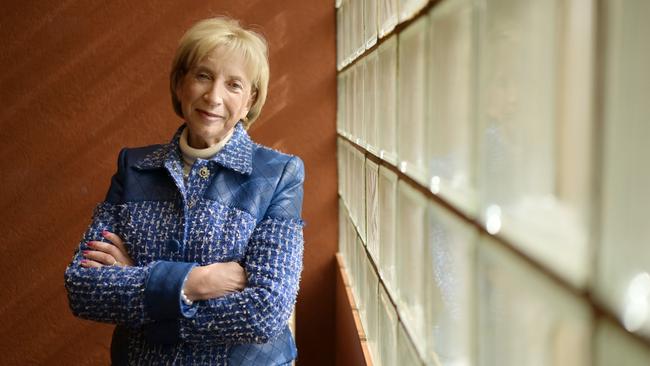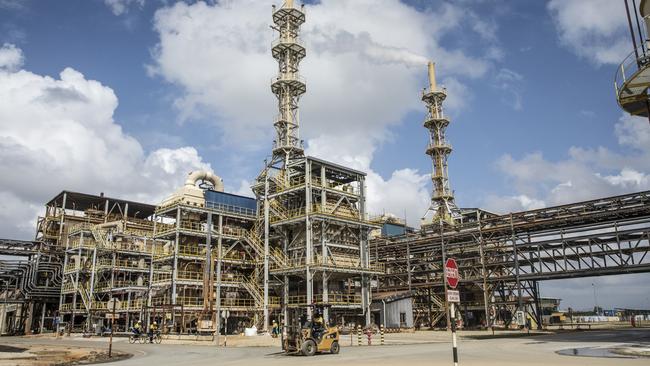Western governments to blame over China’s critical minerals dominance, says Lynas boss.
Government support for the critical minerals sector is welcome, says Lynas boss Amanda Lacaze, but a consistent industry policy is what will really drive the sector.

Lynas Rare Earths boss Amanda Lacaze says the West needs to end industry “policy ADHD” if it wants to rebuild supply chains and challenge China’s domination in critical minerals.
Ms Lacaze told shareholders at Lynas’ annual meeting on Tuesday that she was bemused at the flood of government money flowing into the sector, saying officials had been asleep at the wheel as China built up its dominant position over the last 30 years.
“I think that Western governments struggle with really good industry policy and planning. I engage with a lot of governments and regulators, and they’re almost offended by the fact that China has managed to develop this dominant position,” she said.
“Thirty years ago, China knew they had a resource but they didn’t even know how to do the first steps of processing – much less the advanced manufacturing that they do today. Their dominance in the market is a result of 30 years where the West has said we’re happy to be able to just access cheap materials.
“Then all of a sudden, we got this indignation that ‘how dare China be so dominant?’ Well, it was 30 years worth of policy and strategy well executed.”
Ms Lacaze told shareholders the introduction of 10 million electric vehicles into automotive markets would require the same amount of rare earth metals that Lynas – the only significant refiner outside of China – produced in its Malaysian facility last financial year, with the widespread introduction of wind turbines to push demand up over the decade.

Lynas has been the long-term beneficiary of cheap loans from the Japanese government, which recognised the need to challenge China’s dominance of the sector more than a decade ago.
More recently, Lynas has won funding from the US government to help build rare earth processing plants to supply its hi-tech industries. The Australian government has also thrown cash at the sector, with Lynas rival Iluka Resources the beneficiary of a $1.2bn lending facility for the construction of a refinery in Western Australia.
Ms Lacaze told shareholders that the recent flood of support was welcome, but said Western governments needed to stay the course – and focus on delivering the necessary infrastructure to help the industry grow rather than placing “a bet here and a bet there” on individual companies.
“I find that particularly the Australians, the US and the Europeans really are struggling with the idea that if they want to be able to change these dynamics, they need not to have policy ADHD. They actually need to plan industry policy and stick to it,” she said.
Ms Lacaze said Lynas was working on ways to double its production over the next decade, with the company looking beyond its current capital spending plans in the US and WA – where it is building a cracking and leaching plant in Kalgoorlie – to find ways to sweat its current assets.
“We’ve got to do more at each stage. We will have some additional separation assets with the proposed plan and the plant in the US but the most cost effective way ever to increase production is by increasing everything at your existing assets,” she said.
“Our team is working on a flow sheet which will allow us to increase production through solvent extraction without having to make huge additional investments. Everything has some cost associated with it and we will need to put in some additional calcination facilities and product finishing and make some changes to the precipitation circuit.”
But with a rare earth boom gathering pace across the globe, Lynas chair Kathleen Conlon warned shareholders the company faced increasing competition for its skilled workers. “The board is acutely aware that we operate in a highly competitive market and that the specialised skills of our team are in high demand in the rare earths and other minerals processing industries,” she said.
While Lynas booked a record $540m net profit last financial year, and was recently released from debt covenants that allow it to begin paying dividends, Ms Conlon played down the chances of shareholders receiving a dividend payment in the near future.
“We have a very large capital requirement,” she said.
Lynas shares rose 2.3 per cent, or 19c, to close at $8.54.





To join the conversation, please log in. Don't have an account? Register
Join the conversation, you are commenting as Logout